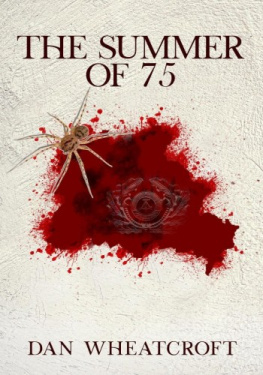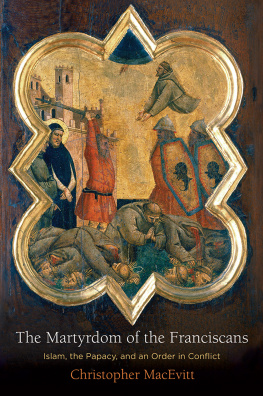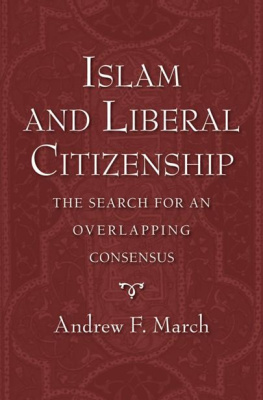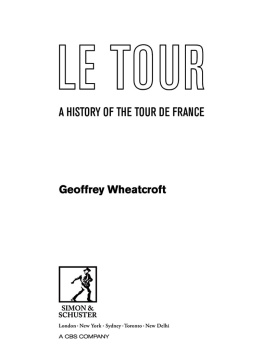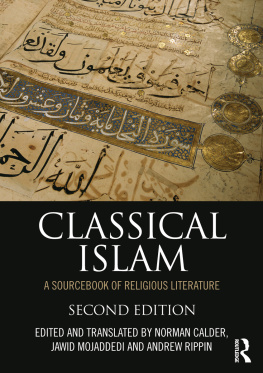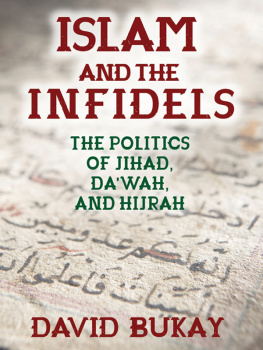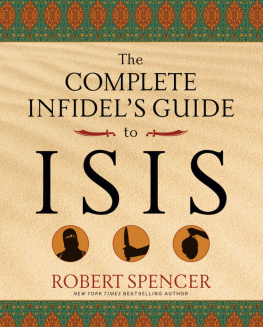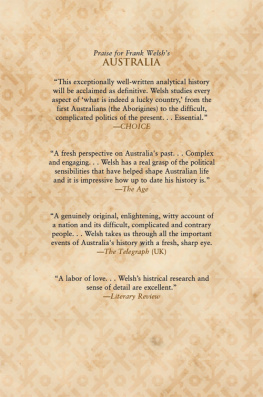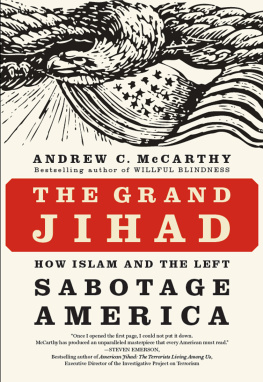Andrew Wheatcroft - Infidels: A History of the Conflict Between Christendom and Islam
Here you can read online Andrew Wheatcroft - Infidels: A History of the Conflict Between Christendom and Islam full text of the book (entire story) in english for free. Download pdf and epub, get meaning, cover and reviews about this ebook. year: 2003, publisher: Random House, genre: Science fiction. Description of the work, (preface) as well as reviews are available. Best literature library LitArk.com created for fans of good reading and offers a wide selection of genres:
Romance novel
Science fiction
Adventure
Detective
Science
History
Home and family
Prose
Art
Politics
Computer
Non-fiction
Religion
Business
Children
Humor
Choose a favorite category and find really read worthwhile books. Enjoy immersion in the world of imagination, feel the emotions of the characters or learn something new for yourself, make an fascinating discovery.

- Book:Infidels: A History of the Conflict Between Christendom and Islam
- Author:
- Publisher:Random House
- Genre:
- Year:2003
- Rating:4 / 5
- Favourites:Add to favourites
- Your mark:
- 80
- 1
- 2
- 3
- 4
- 5
Infidels: A History of the Conflict Between Christendom and Islam: summary, description and annotation
We offer to read an annotation, description, summary or preface (depends on what the author of the book "Infidels: A History of the Conflict Between Christendom and Islam" wrote himself). If you haven't found the necessary information about the book — write in the comments, we will try to find it.
Infidels: A History of the Conflict Between Christendom and Islam — read online for free the complete book (whole text) full work
Below is the text of the book, divided by pages. System saving the place of the last page read, allows you to conveniently read the book "Infidels: A History of the Conflict Between Christendom and Islam" online for free, without having to search again every time where you left off. Put a bookmark, and you can go to the page where you finished reading at any time.
Font size:
Interval:
Bookmark:
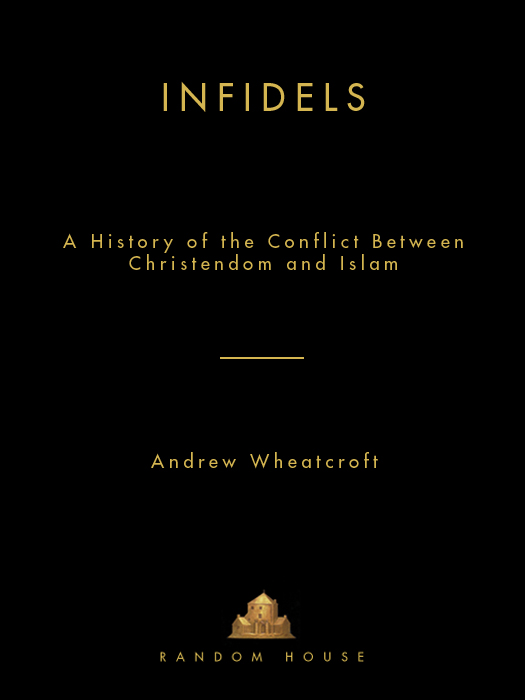
ALSO BY ANDREW WHEATCROFT
The Ottomans: Dissolving Images
The Habsburgs: Embodying Empire
The World Atlas of Revolutions
The Road to War (with Richard Overy)
Zones of Conflict: An Atlas of Future Wars (with John Keegan)
Whos Who in Military History: From 1453 to the Present Day (with John Keegan)
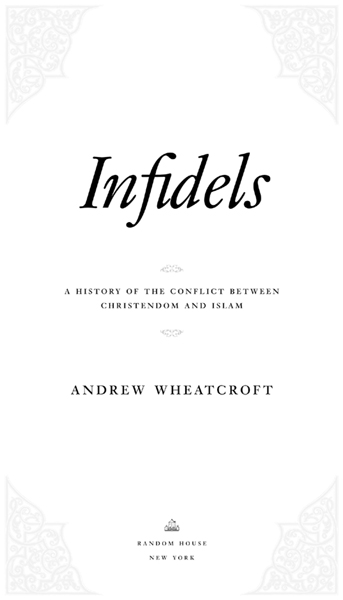
Copyright 2003, 2004 Andrew Wheatcroft
All rights reserved under International and Pan-American Copyright Conventions. Published in the United States by Random House, an imprint of The Random House Publishing Group, a division of Random House, Inc., New York.
This work was originally published in the U.K. by Viking, an imprint of Penguin Books, in 2003.
R ANDOM H OUSE and colophon are registered trademarks of Random House, Inc.
Grateful acknowledgment is made for permission to reproduce an extract from Lepanto by G. K. Chesterton. Reprinted by permission of A. P. Watt, on behalf of the Royal Literary Fund.
LIBRARY OF CONGRESS CATALOGING-IN-PUBLICATION DATA
Wheatcroft, Andrew.
Infidels : a history of the conflict between Christendom and
Islam / Andrew Wheatcroft.
p. cm.
Originally published: London : Viking, 2003.
eISBN: 978-1-58836-390-9
1. IslamRelationsChristianity. 2. Christianity and other
religionsIslam. 3. Kufr (Islam) I. Title.
BP172.W 52 2004
261.27dc22
2003070378
Random House website address: www.atrandom.com
v3.1
For
ERIC OSCAR WHEATCROFT
in love and gratitude
History is the most dangerous product ever concocted by the chemistry of the intellect. It causes dreams, inebriates nations, saddles them with false memories keeps their old sores running, torments them when they are not at rest, and induces in them megalomania and the mania of persecution.
PAUL VALRY
Reflections on the World Today


THESE PAGES RECORD MY THANKS TO SOME OF THOSE WHO HAVE helped me understand the Infidels conundrum. With many, like Hassan and Mahmud, who appear in the preface, I do not know their full names. Chance has also played a large part. Often it was an unexpected and anonymous conversation in Amman or Texas that propelled me in a new (and profitable) direction. But I am particularly grateful to some I can name. First, those who have undertaken the thankless task of reading part (or all) of the text and putting me right. Dejan Jovi has been kind enough to read through my chapters on the Balkans, suggesting many changes and improvements, and has not scorned my temerity (and ignorance) in trampling around in a field where I had so shallow a knowledge. Part of my newfound passion for southeastern Europe stemmed from the excellent Creating the Other conference at the University of Minnesota (Minneapolis). Organized by the Center for Austrian Studies in May 1999, it had many Balkan tensions bubbling away below the surface. Yet we talked as dispassionately as possible about tragic events. With this book, likewise, detaching my own feelings from the subject matter that I was writing about has not always been easy.
Another area that I entered with very little prior knowledge was the role of language. Lance Butler has read every word, not just the material on language, and his advice and support have been invaluable. So too have Susanne Peterss help and advice. She has also read every chapter, sometimes in several variants. She provided me with a stream of books and articles to read, found many unusual and unexpected sources, as well as giving me consistent encouragement. Judy Delin explained complicated ideas in linguistics with such clarity that I could understand them, plus the directness to tell me when I should not use them. Michael Rice invariably gave me good advice on the texts I sent him, from his profound knowledge of many areas of the Middle East. Finally, my father, E. Oscar Wheatcroft, has read it all, an especial labor of love given his failing eyesight. Thankfully, his critical sense is still hyperactive and he saved me from many errors, such as having my galleys rowing in reverse, the result of landlubberly ignorance. None of them bear any responsibility for the flaws that remain.
I have also made myself a nuisance to many others with nave questions that they answered with good grace. John Drakakis, Neil Keeble, Robert Miles, David Bebbington, Mark Nixon, Oron Joffe, in particular, must have dreaded my appearing round the corner at Stirling. This is also the first book I have completed with the full availability of e-mail and the Internet. While my colleagues have had some reason for answering my questions, those thousands of miles away who had never heard of me had no reason to do so. I am thankful for the help and advice of Carter Vaughn Findley, Jonathan Bloom, Dan Goffman, Robert Michaels, Larry Wolff, David Nirenberg, and Eva Levin. Others, like Stephen Greenblatt, Roger Chartier, Thomas Emmert, Hugh Agnew, Margaret Meserve, Nancy Wingfield, and Maiken Umbach, have had the misfortune to be pinned to a wall over a conference coffee break or interrogated over dinner. From John Keegan, I have understood, over so many years, to try and see things with clarity, regardless of the fog of battle. It was John who suggested my first book, so my gratitude extends back a very long way. From Colin and Charlotte Franklin, I learned the importance of feeling and touching books, and amid the riches of their book barns at Culham, learned well. Two people have helped me with research for this book, where either I did not have the time or the languages. Lina Barouch (whom Avi Shlaim shrewdly suggested) helped me enormously by assessing Hebrew material, reading the text, and advising me on it. She has a wonderful eye both for things that dont work and for the inspired suggestion of something that might work. Anneyce Wheatcroft has never complained about being asked to burrow in the darker and dirtier parts of libraries and archives on my behalf. She too has the instinctive sense for unlikely but invaluable material. I am very grateful to them both.
I am very grateful to all those who have helped me by pointing out mistakes in the first printing of this book, in May 2003. Rana Kabbani, Jonathan Falla, Jonathan Benthall, and John Adamson have all been kind enough not only to remind me of literals, but also to suggest where another interpretation was better than the one I had offered. I have been very happy to adopt their suggestions, and thank them both for their courtesy and their careful reading. Carol Buchalter Stapp spent hours patiently disentangling the complex issues in the last chapter: her insights have been invaluable. I also want to thank John Torpey, who has generously responded to all my questions and uncertainties concerning the same endlessly revised and updated chapter.
Writing a book like this, which ranges over so many disparate areas and subjects, makes a real imposition on your friends. Rosemarie Morgan bore the brunt of the first phases. She smoothed access at Yale, provided endless hospitality, and employed an incisive critical pencil. Without her help, this book would have been much harder to write. John Brewer and Stella Tillyard have been the best friends (and hosts) anyone could have, in Florence and in Oxford. They have also contributed more to this book, from what they have written, from conversations, or from chance asides, than they could ever have realized. So too have Fuad Qushair in Amman, with whom I roamed over deep questions concerning the Arab world and the Arabic language; Mamdouh Anis and Christian Koch in Abu Dhabi, from whom I learned how to keep a book on track. In England I am grateful to David Batson, with his knowledge of the early church; Richard Stoneman, for his expert knowledge of Greece and Turkey; Geoffrey Best, for his friendship over many years; and Roy Douglas, who helped me to decipher images. Among many others who have been there with advice, help, or company when I needed it, I want to mention in particular Mohammad Cherki and Djaffar Hadji, who introduced me to the new literature of Algeria; Angelica Hamilton, whose constant verve and enthusiasm stopped me doubting the whole enterprise; Nagdi Madbouli, on whom I tested Arabic meanings; Andrew Sobi and Alec Stankovi, with whom I talked endlessly about the Balkans; and finally Freddie Merle and Charlie Seddon, the good companions.
Font size:
Interval:
Bookmark:
Similar books «Infidels: A History of the Conflict Between Christendom and Islam»
Look at similar books to Infidels: A History of the Conflict Between Christendom and Islam. We have selected literature similar in name and meaning in the hope of providing readers with more options to find new, interesting, not yet read works.
Discussion, reviews of the book Infidels: A History of the Conflict Between Christendom and Islam and just readers' own opinions. Leave your comments, write what you think about the work, its meaning or the main characters. Specify what exactly you liked and what you didn't like, and why you think so.

